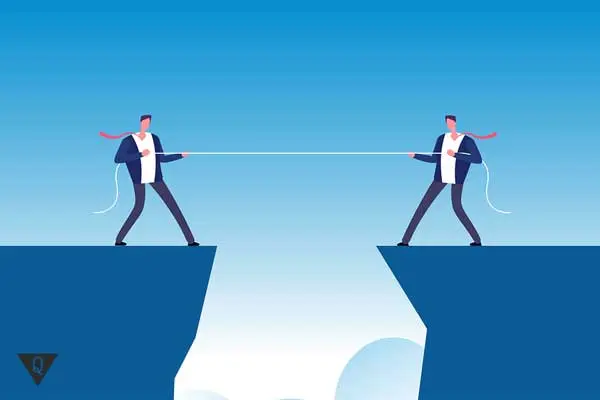Contents
Hello! Intrapersonal conflicts are internal aspirations, desires that are contradictory. Such is the internal dispute, which deprives of strength and resources. It can be painful and in some cases seem intractable.
And today we will try to figure out what types of intrapersonal conflicts exist, as well as how they can be resolved.
What are they?
They are present in every person and even in several species at the same time. Basically, they are repressed, so the psyche tries to protect itself from stress. Therefore, they have a huge impact on all areas of our lives. For the most part, affecting health.
Since they are not resolved, but repressed, they are very often repeated and stop the development of the personality until it finds the cause of internal disagreements and copes with them.
The inconsistency is manifested even in such trifles as the desire to go to a party to meet new people, chat with someone and at the same time stay at home in silence, relax after a working day.
The presence of an internal conflict can be tracked if you avoid something, do not understand why you are doing some rash acts, where diseases or anxieties, fears come from.
Suppose you are trying to minimize contact with your parents, sometimes forcing yourself to call them and congratulate them on the holidays. And here one could think about the lack of love for them, connection, but in fact it may turn out that the reasons for such behavior are, on the contrary, too strong feelings towards them.
When there is a desire to simultaneously receive love from them and at the same time remain independent, an adult who has already separated.
Basic views

Autonomy — Addiction
Confronting desires to be invulnerable to the pain that is inevitable in intimate relationships, as well as to meet a person with whom you will be good and happy.
That is, at the same time, a person tries to be independent, not dependent on anyone, but at the same time suffers from loneliness and dreams of love. Even if it suppresses some need. Most often unconsciously.
For example, with a successful career, when life develops as you would like, a feeling of satisfaction and joy does not come inside. On the contrary, there is emptiness, disappointment and even annoyance.
Fear of pain from loss sometimes prevents you from building contact with others. They will be broadcast a message to stay away. And then there may be bewilderment why it doesn’t come out to find your soul mate.
Submission — Control
When, on the one hand, you want to dominate others, and on the other hand, you want to obey. And the stronger need will win.
Let’s pretend to be good and not argue. Then the employee will not defend his opinion in front of his superiors, wanting to please him. But subconsciously, he will begin to perform actions that will be regarded as a rebellion. Restrained anger, due to the lack of the right to present it to a more powerful figure, will make itself felt in the form of passive aggression.
A simple example: being late for an important meeting. Or the loss of valuable documents, messages. It seems to be not to blame, he did not intentionally make a mistake, but he caused damage to the enterprise. Let it be insignificant.
Need for care — Refusal of help
The peculiarity is that a person either uses other people, exploits, or does not want to accept anything from them, trying to survive only on his own resources. Moreover, he helps, but does not accept help in return.
This drains and causes a lot of resentment and anger at the subconscious level. After all, if you look, his needs for support, care, attention and other things are bare. He seeks to show in every way that he is already doing well and that it is better for him to share what he has than if he is considered needy, in trouble.
Exploiters also go through a lot of internal difficulties. The basic law of survival and, in general, existence is the mutual exchange of the organism with the environment. That is, I give something, and in return I receive and vice versa. If the energy is inhibited, problems arise in health, personal life, and so on.
Significance — Insignificance

It’s a problem with self-esteem. The individual does not know his real resources, shortcomings. Therefore, it tends to either constantly emphasize its significance, or seek confirmation of unsurpassedness from the outside.
I think you’ve met people who are really nothing but demand to be treated like they really are kings. Those who are important for evaluation and recognition will dedicate their actions to the people around them, trying to attract attention. Evaluation is important to them, it is on it that they are guided instead of listening to their own feelings.
At the other extreme, insignificance. A person, wanting to be finally noticed and recognized, acts in an amazing way. It devalues and diminishes itself. Considering that she doesn’t know anything sensible, that other fellows have talents, and her role is almost to serve them.
Just imagine how much rage accumulates inside, since a person does not give himself the opportunity to manifest himself and satisfy the need for recognition, stopping at the thought that nothing will come of it.
Take the blame — Blame
On one pole there is a desire to be responsible for everything, respectively, to blame oneself for any failures, and on the other — the desire to be irresponsible and not involved in any events, which is why one blames others for all the troubles.
The presence of this conflict can be seen, for example, when a child cries. If, instead of clarifying what happened, a person begins to think that because of him, or immediately rushes to look for offenders, reproach for indifference, and so on.
stand out — don’t stand out
A person either always tries to compete with everyone. Moreover, competition can be not for something, but for the sake of competition itself. Or he avoids any moments where it is necessary to manifest himself, to declare himself. He does not seem to give himself permission and the right to declare his interests and rights. Why is looking for a relationship in which there is no hint of rivalry.
In the first variant, in the active manifestation of the conflict, a person tries to prove that he is the best of all whom he knows and does not know.
Identity
When there are ideas about oneself, one’s identity, but they turn out to be completely contradictory with one’s other features and identities.
For example, a girl grew up in a very poor family, in poverty, but she married a wealthy man. And then a dissonance arises inside her, she may feel out of place, experience anxiety and uncertainty, especially at every mention of a new status.
In such cases, a person tends to devalue his other features, as they say, renounces the past. Or demonstrate every time helplessness and confusion in situations that require stability and confidence.
Types

- Motivational. When an individual cannot choose between «good» and «bad». For example, if he is offered a highly paid, but not interesting job. And he can’t figure out what to do. Do what is valuable to him, but does not give him the opportunity to feel material independence, or move to another job, have everything to the maximum, but at the same time literally force himself to get up in the morning.
- Role. When it is impossible to realize simultaneously interests from different social roles. A banal example is to defend the right to independence of an adult mature person, while pleasing her mother.
- Moral. When it is difficult to decide, to make a choice either in the direction of your needs, or debt.
- Adaptive. Inability to adapt to new circumstances.
- Ideality. This is a confrontation between the ideal and the real. The modern world of fashion dictates its canons of beauty, which most people do not fit into. Despite the fact that you really want to. Beautiful pictures of women in glossy magazines cause an irresistible desire to be like them. It seems that only by approaching this image, it is possible to become happy, successful. They may reject their personal characteristics, ignore the good that is in life or in general, there will be a ban on what is loved. For example, such a girl, having stopped eating sweets, will constantly, as if in the background, experience tension, anger from dissatisfaction.
- Inconsistencies. If thoughts and feelings, sensations do not coincide at all. This can be seen when a person talks about joy, but non-verbal signs unconsciously demonstrate sadness.
Causes
- Self-esteem that is not true;
- Commitments that proved beyond our strength. For some reason, the individual was not in his place, and «saving face», as they say, is necessary. Why does he try to comply, coping with those tasks that, in fact, are impossible to cope with. At least to him. This often happens when parents buy a pet for a small child and expect him to be responsible for it. But in the end, they have to feed, walk, and so on. Why is the child himself accused of promising to do it on his own, but now he has forgotten. This kind of responsibility is an unbearable burden for a little man who is just being formed, not yet becoming a mature person;
- Inability to make decisions. The individual, as it were, expects that the situation will resolve itself, without his active participation. Why is there a layering of unsatisfied needs that cause tension;
- Inability to creatively adapt to the situation. That is, a person constantly acts according to the same scheme, despite the fact that sometimes it does not work. Acting in the old way, he expects a new result;
- Lack of necessary information on how to act in any situations;
- Lack of communication with others to share experience and get answers to disturbing questions. And in general, the very fact of the presence of another person in life, who cares;
- Social pressure. In principle, social pressure is the main cause of these conflicts. Since the discrepancy between desires and norms and rules leads to constant fighting deep inside.
How to resolve?

Basically, the person believes that he has nothing to do with the conflict itself. It seems to happen without her participation. But actually it is not. It is only important to recognize that it exists, and also to refrain from accepting only one side of it, more acceptable.
Be attentive to your feelings, only in this way you will understand in which direction to move. Remember, anger is not bad, it is a marker that something is happening to you that you do not like.
Therefore, instead of reproaching your character for irritability and temper, ingratitude and so on, try to think about what you would like to change. How else can you act to experience relief, joy and satisfaction.
And it is also necessary to realize what is behind it, what kind of need. For example, a young man is unable to decide who to go to study, a doctor, as his parents want, or an actor, as his heart dictates.
The choice is difficult, especially if relations with relatives are not the best, but rather difficult and disobedience threatens with isolation or even rejection. But if you go deeper, you can understand what is behind these two different roads — professional development.
It is in this direction that it is necessary to move, in the direction where his abilities and work are recognized and appreciated. And, importantly, where he himself will feel that he is in his place.
Completion
Be at peace with yourself! Try something new, experiment and follow your interest. Limiting oneself in everything leads to disappointment, dissatisfaction. Then it is difficult to talk about a rich and high-quality life.
Also, we recommend reading an article about the impact of stress on human health.
Good luck and success, dear readers!
The material was prepared by a psychologist, Gestalt therapist, Zhuravina Alina









